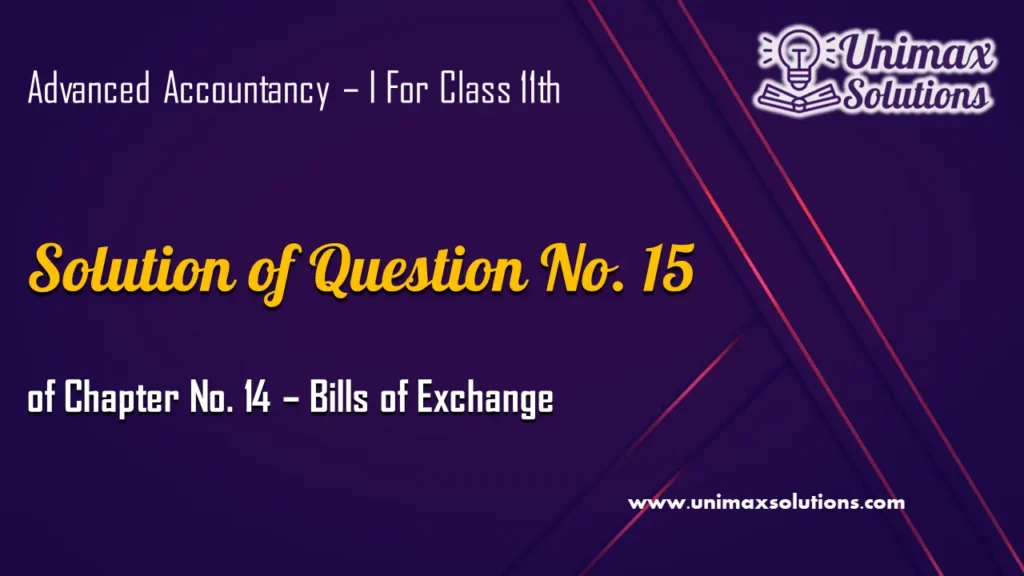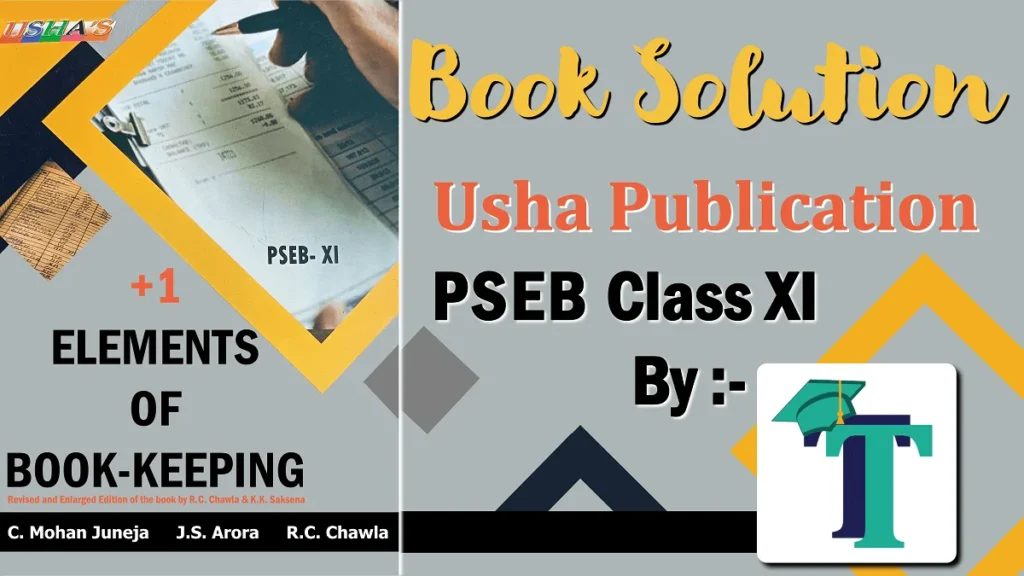
Advertisement
Question 15 Chapter 14 – Class 11 Unimax
15.On 13th June,2019 A receives two acceptance from B for ₹ 6,000 and 4,000 for two months and 3 months respectively. On 1st July,2019 both the bills were sent to bank for collection. The first bill is met on maturity while the second bill is dishonoured. Collection charges charged by bank for the first bill amounting to ₹ 30 while the noting charges for the second bill paid by bank amounting to ₹ 50. Pass journal entries in the book of A and B.
The solution of Question 15 Chapter 14 – Class 11 Unimax
| Journal for Mr. ‘A’ (Drawer) | |||||
| Date | Particulars | L.F. | Debit | Credit | |
| 2019 | |||||
| June 13 | Bill receivable A/c (1) | Dr. | 6,000 | ||
| To B’s A/c | 6,000 | ||||
| (Being the first bill two months drawn and accepted) | |||||
| June 13 | Bill receivable A/c (2) | Dr. | 4,000 | ||
| To B’s A/c | 4,000 | ||||
| (Being the demand bill for three months drawn and accepted) | |||||
| July 1 | Bill sent for collection A/c | Dr. | 10,000 | ||
| To Bill receivable A/c (1) | 6,000 | ||||
| To Bill receivable A/c (2) | 4,000 | ||||
| (Being both the bill sent to bank for collection) | |||||
| Aug.16 | Bank A/c | 6,000 | |||
| To Bill sent for collection A/c | 6,000 | ||||
| (Being the first bill collected by bank on due date) | |||||
| Aug.16 | Bank charges A/c | 30 | |||
| To Bank A/c | 30 | ||||
| (Being bank charges for collection of bill recoded) | |||||
| Sep.16 | B’s A/c | 4,050 | |||
| To Bill sent for collection A/c | 4,000 | ||||
| To Bank A/c | 50 | ||||
| (Being the second bill dishonoured on due date and bank paid ₹ 50 as noting charges) | |||||
| Journal for Mr. ‘B’ (Drawee) | |||||
| Date | Particulars | L.F. | Debit | Credit | |
| 2019 | |||||
| June 13 | A’s A/c | Dr. | 6,000 | ||
| To Bill payable A/c (1) | 6,000 | ||||
| (Being the first bill 2 months acceptance and returned) | |||||
| June 13 | A’s A/c | Dr. | 4,000 | ||
| To Bill payable A/c (2) | 4,000 | ||||
| (Being the for 3 months acceptance and returned) | |||||
| Aug.16 | Bill payable A/c | 6,000 | |||
| To Cash A/c | 6,000 | ||||
| (Being the first bill met at maturity) | |||||
| Sep.16 | Bill payable A/c | Dr. | 4,000 | ||
| Noting charges A/c | Dr. | 50 | |||
| To A’s A/c | 4,050 | ||||
| (Being the second bill dishonoured on due date and ₹ 50 as noting charges paid) | |||||
End of Solution
Check Out the Solution of all questions for this chapter:
The solutions to all questions of Chapter 14 – Bills of Exchange Unimax – Class 11 are shown as follows, click on the image of the question to get the solution.
Question 3 Chapter 14 – Class 11 Unimax
Advertisement
Question 9 Chapter 14 – Class 11 Unimax
Advertisement
Question 14 Chapter 14 – Class 11 Unimax
Advertisement
1. Comprehensive Solutions for All Chapters of Advanced Accountancy I Class 11 by Unimax
UnimaxSolutions.in offers a comprehensive solution for students studying Advanced Accountancy I Part 1 in Class 11. With their meticulously curated study material, students can access comprehensive solutions to all the questions included within each chapter. By selecting the chapter name from the study material, students can easily navigate through the topics and find detailed explanations and step-by-step solutions to the problems presented in that section. Whether it’s understanding complex accounting concepts, mastering calculation techniques, or analyzing financial statements, Unimax provides a valuable resource to aid students in their learning journey. With these comprehensive solutions at their disposal, students can enhance their understanding, clarify doubts, and improve their problem-solving skills in Advanced Accountancy, ensuring they are well-prepared for their Class 11 examinations.
- Chapter No. 1 – Introduction of Accounting
- Chapter No. 2 – Theory Base of Accounting
- Chapter No. 3 – Vouchers and Transactions
- Chapter No. 4 – Journal
- Chapter No. 5 – Goods and Services Tax (GST): An Introduction
- Chapter No. 6 – Ledger
- Chapter No. 7 – Special Purpose Book – Cash Book
- Chapter No. 8 – Other Subsidiary Books
- Chapter No. 9 – Trial Balance
- Chapter No. 10 – Rectification of Errors
- Chapter No. 11 – Depreciation
- Chapter No. 12 – Provision and Reserves
- Chapter No. 13 – Bank Reconciliation Statement
- Chapter No. 14 – Bills of Exchange
- Chapter No. 15 – Financial Statements (Without Adjustments)
- Chapter No. 16 – Financial Statements (With Adjustments)
- Chapter No. 17 – Accounts from Incomplete Records – Single Entry System
2. Punjab School Education Board (PSEB) Solutions of Usha Publication.
If you’re a student enrolled in the Punjab School Education Board Class 11, it’s essential to explore a wide range of books to cover the syllabus thoroughly. While the prescribed textbooks are undoubtedly valuable, supplementing your studies with additional resources can enhance your understanding and knowledge. Consider checking out other books that align with the curriculum, offering different perspectives and insights on the subjects you’re studying. These supplementary materials can provide you with alternative explanations, practice questions, and examples that may aid in clarifying complex concepts. Moreover, exploring diverse sources can expose you to a variety of writing styles and viewpoints, fostering a broader understanding of the subjects. So, seize the opportunity to expand your learning by delving into other books that can complement your studies and contribute to your academic growth.
Advertisement

